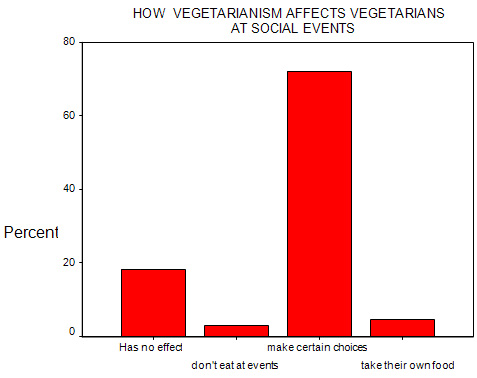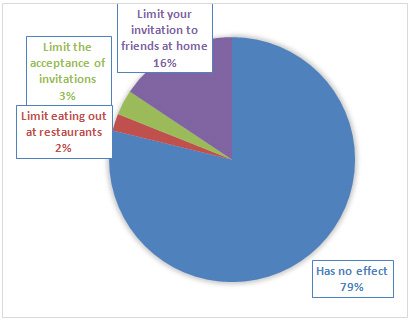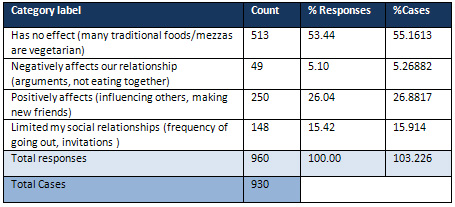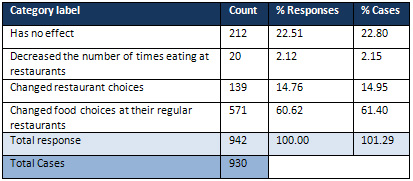In
this
study,
the
researcher
investigates
the
social
effects
of
a
vegetarian
diet
on
the
people
in
Lebanon:
dining
out,
their
relationships
with
friends
and
family,
eating
at
work
and
its
ease
or
practicality
within
a
traditional
diet.
The
research
follows
a
quantitative
approach
which
consists
of
a
questionnaire
and
the
analysis
and
interpretation
of
the
generated
data
with
the
help
of
Statistical
Package
for
the
Social
Sciences
(SPSS).
a.
Research
variables
The
researchers
covered
the
necessary
variables
needed
in
order
to
form
a
clear
understanding
about
the
subject.
And
as
clearly
stated
in
the
analysis
below,
two
or
more
of
these
different
variables
together
with
the
help
SPSS
were
linked.
The
set
of
independent
variables
investigated
in
this
study
are:
1.
Profession
Occupation
2.
Age
3.
Gender
4.
Marital
Status
5.
Number
of
Members
Living
in
the
Same
Household
6.
Number
of
Meals
Consumed
per
Day
7.
Influence
of
Vegetarianism
on
Accepting
and
Giving
Out
Invitations
8.
Effect
of
Vegetarianism
on
Eating
Out
9.
Effect
of
Vegetarianism
on
Participating
in
Social
Events
10.
Effect
of
Vegetarianism
on
Relationships
with
Friends
11.
Effect
of
Vegetarianism
on
Relationship
with
Family
12.
Relationship
Between
Vegetarian
Food
and
Traditional
Food
b.
Data
Collection
and
Analysis
The
most
common
source
of
data
for
such
research
is
communicating
with
respondents.
Thus,
this
study
used
a
set
of
questionnaires
filled
by
a
random
sample
of
respondents.
Since
the
percentage
population
who
have
followed
a
vegetarian
diet
or
have
sufficient
knowledge
of
it
is
small,
only
individuals
who
have
been
exposed
to
this
diet
were
studied.
A
subject
data-gathering
technique
would
provide
a
deeper
and
wider
range
of
information.
For
this
reason,
a
one-on-one
survey
was
used.
In
addition,
the
sample
size
was
limited
to
930
individuals.
The
samples
were
collected
from
a
few
supermarkets
(near
the
organic
and
produce
sections),
universities,
schools
(staff)
and
at
gatherings
(church
events,
friendly
lunches,
etc...)
between
Beirut,
Kesserwan
and
Northern
Lebanon.
These
places
have
residents
or
frequent
visitors
of
different
age
groups
and
from
the
main
coastal
cities
or
surrounding
suburbs/villages.
c.
Research
Question
and
Hypotheses
Q1:
How
are
vegetarian
people
in
Lebanon
affected
from
a
social
perspective?
All
of
the
hypotheses
discussed
below
are
based
on
the
surveyed
sample
of
vegetarians
in
Lebanon.
H1:
Less
than
25%
of
the
sample
decrease
the
number
of
times
eating
out
at
restaurants.
H2:
More
than
50%
of
the
sample
change
their
food
choices
at
their
regular
restaurants.
H3:
Less
than
50%
of
the
sample
manage
to
encourage
friends
or
family
members
to
consume
more
vegetarian
meals.
H4:
More
than
50%
of
the
sample
believe
that
they
can
find
many
vegetarian
traditional
Lebanese
foods
during
family
meals
or
social
gatherings.
H5:
More
than
60%
of
the
students
or
employed
vegetarians
bring
their
own
food
to
their
occupations.
H6:
More
than
25%
of
the
sample
experience
positive
and/or
no
effects
on
their
overall
relationships
with
friends
and
family.
d.
Scope
and
Limitations
There
were
several
limitations
to
this
study
such
as
time
and
places
from
which
samples
were
collected.
The
first
major
limitation
of
this
study
was
the
sample
size.
Choosing
people
exposed
to
vegetarianism
from
a
random
sample
of
respondents
to
gather
data
from,
and
then
checking/organizing
the
gathered
data
,
the
researcher
was
bounded
with
a
set
of
930
questionnaires.
Another
limitation
was
the
fact
that
the
researcher
had
limited
places
from
which
to
gather
information.
The
researcher
gathered
information
from
a
few
places
from
the
coast
of
Beirut
to
the
Northern
coast
passing
through
Kesserwan
;
yet
trying
to
choose
a
diversified
sample
from
most
parts
of
Lebanon
(targeting
a
sampled
population
residing,
working
in
or
visiting
these
districts
from
suburbs
and
surrounding
villages).
A
third
limitation
was
the
integrity
of
the
respondents,
in
answering
the
questionnaires
which
plays
a
good
deal
of
importance
in
the
efficiency
of
the
model.
The
sample
is
composed
of
930
respondents.
According
to
the
"normal
distribution
theory",
the
sample
size
lead
to
results
that
have
a
2.8
%
margin
error
and
95%
confidence
interval
[1].
All
the
results
are
presented
in
charts
and
tables
obtained
from
the
output
files
of
the
SPSS
software.
a.
Data
Analysis
&
Testing
As
illustrated
in
the
bar
chart
below:
•
73.6%
of
the
sample
makes
certain
food
choices
at
social
events,
while
only
3%
don't
eat
at
certain
social
events
(Chart
1).

Chart
1:
Percentage
of
sample
responses
to
social
events
of
vegetarians
It
is
clearly
illustrated
in
the
tables
below
how
vegetarians
can
convince
other
family
members
to
consume
more
vegetarian
food.
•
During
a
family
meal,
35.48
%
of
the
sample
managed
to
convince
other
family
members
to
eat
more
vegetarian
food,
while
59.89
%
consumed
their
own
vegetarian
food
when
other
members
were
eating
their
non-vegetarian
meal
(Table
1).

Table
1:
Sample
responses
to
the
effects
of
a
vegetarian
diet
on
other
family
members
while
dining
together
b.
Multiple
Responses
of
Data
There
were
some
multiple
responses
to
several
questions
targeted.
Thus,
some
information
was
drawn
based
on
those
responses,
some
of
which
are:
•
Only
2%
of
the
sample
limited
eating
out
at
restaurants
and
16%
limited
their
invitations
to
their
own
home,
while
79%
of
the
vegetarians
experienced
no
effect
in
their
social
life
(Chart
2).
•
26.04%
of
the
sample
had
positive
effects
on
their
family
and
friends,
whether
by
encouraging
them
to
eat
more
vegetarian
food
or
by
simply
making
new
friends
that
encourage
or
follow
a
similar
diet.
A
good
53.44%
were
not
affected
by
their
vegetarian
diet
since
much
of
the
served
food,
including
the
traditional
food
and
'mezzas',
had
plenty
of
vegetarian
options
(Table
2).
•
Only
5.1%
of
the
sample
had
negative
experiences
such
as
small
arguments
and
15.42%
simply
limited
their
social
relations
(Table
2).
•
60.62%
of
the
sample
changed
their
food
choices
at
their
regular
restaurants,
while
only
14.76%
changed
the
restaurants
(Table
3).

Chart
2:
Influence
of
Vegetarianism
on
the
general
social
life
of
vegetarians

Table
2.
Overall
effects
of
Vegetarianism
on
relations
between
vegetarians
and
their
non-vegetarian
friends
&
family

Table
3:
Influence
of
Vegetarianism
on
eating
out
at
restaurants
c.
Cross
Tabulation
of
Data
Cross
tabulation
is
extremely
important,
since
it
gives
clear
information
and
comparison
between
any
two
variables.
The
two
tables
below
are
used
later
on
in
the
conclusions.
•
Within
marital
status,
both
the
married
and
single
(a
total
of
70.23%
of
the
sample)
managed
to
convince
family
members
to
start
eating
more
vegetarian
food
(Table
4).
•
Within
occupation,
85.78%
of
the
students
and
69.66%
of
the
employed
brought
their
own
food
to
school,
college
or
work
(Table
5).
Click
here
for
Table
4:
Cross
tabulation
between
"Marital
Status"
and
"How
Vegetarianism
affects
one's
relationship
with
family
members
during
a
meal".
Click
here
for
Table
5:
Cross
tabulation
between
"Occupation"
and
"How
vegetarianism
affects
one
at
work/school
or
university".
d.
Hypothesis
Testing
•
H1:
Less
than
25%
of
the
sample
decrease
the
number
of
times
eating
out
at
restaurants.
According
to
table
3,
2.12%
of
the
sample
limits
eating
out
at
restaurants.
Thus,
this
hypothesis
is
accepted.
H1->
accept
•
H2:
More
than
50%
of
the
sample
change
their
food
choices
at
their
regular
restaurants.
According
to
table
3,
60.62%
change
their
food
choices
at
their
same
regular
restaurants.
Therefore,
this
hypothesis
is
accepted.
H2
->
accept
•
H3:
Less
than
50%
of
the
sample
manage
to
encourage
friends
or
family
members
to
consume
more
vegetarian
meals.
According
to
table
1,
35.48%
of
the
sample
managed
to
convince
family
members
to
consume
more
of
their
vegetarian
food.
Therefore,
this
hypothesis
is
accepted.
H3
->
accept
•
H4:
More
than
50%
of
the
sample
believe
that
they
can
find
many
vegetarian
traditional
Lebanese
foods
during
family
meals
or
social
gatherings.
According
to
table
2,
53.44
%
of
the
sample
believe
they
can
find
and
enjoy
many
traditional
vegetarian
foods
and
their
relationship
with
others
was
not
affected
by
their
vegetarianism.
Therefore,
this
hypothesis
is
accepted.
H4
->
accept
•
H5:
More
than
60%
of
the
students
or
employed
vegetarians
bring
their
own
food
to
their
occupations.
According
to
table
5,
more
than
85%
of
the
students
and
69%
of
the
employees
bring
their
own
vegetarian
food
to
work.
Therefore,
this
hypothesis
is
accepted.
H5
->
accept
•
H6:
More
than
25%
of
the
sample
experience
positive
and/or
no
effects
on
their
overall
relationships
with
friends
and
family.
According
to
Table
2,
around
53%
experience
no
effects
(because
they
enjoy
some
available
traditional
vegetarian
food)
and
around
26%
experience
positive
effects
(like
making
new
friends
who
share
the
same
lifestyle
or
manage
to
convince
others
to
adopt
vegetarianism).
Thus,
put
together,
over
79%
experience
no
or
positive
effects.
Therefore,
this
hypothesis
is
accepted.
H6
->
accept.
Q1:
How
are
vegetarian
people
in
Lebanon
affected
from
a
social
perspective?
This
question
is
tackled
in
hypotheses
H1
through
H6.
The
social
life
of
the
Lebanese
people
represents
a
major
facet
in
their
daily
lives.
Therefore,
the
above
research
question
(Q1)
was
elaborated
on
using
6
hypotheses
to
be
tested.
According
to
Chart
2,
only
2%
of
the
sample
limits
eating
out
at
restaurants,
16%
limit
inviting
people
over
to
their
homes
and
79%
of
the
sample's
general
social
life
was
not
affected
at
all
by
their
vegetarian
diet.
According
to
table
3,
of
those
who
dine
out,
14.76%
changed
restaurants
and
60.62%
made
different
food
choices
that
suit
their
vegetarian
diet
at
their
same
regular
restaurants.
In
regards
to
how
a
vegetarian
diet
affects
ones'
relationship
with
others
while
sharing
a
meal,
3.3%
of
the
sample
weren't
affected
at
all,
and
only
1.29%
of
the
sample
stopped
eating
meals
with
the
rest
of
the
family.
Over
59%
of
them
eat
their
own
vegetarian
food
while
seated
with
the
rest
of
the
family
or
friends,
while
35.48%
were
able
to
convince
family
members
and
friends
to
eat
more
of
their
vegetarian
food
(Table
1).
Only
around
34%
of
the
single
and
36%
of
the
married
vegetarians
were
able
to
encourage
and
convince
other
family
members
to
join
them
in
eating
more
of
their
vegetarian
food.
While
around
56%
of
the
single
and
61%
of
the
married
enjoy
their
own
vegetarian
food
while
other
family
members
are
eating
non-vegetarian
food
(table
4).
Over
53%
of
the
sample
believe
that
they
can
find
many
vegetarian
options
among
the
served
food,
including
in
the
traditional
food
and
mezzas.
Fortunately,
most
vegetarians
(over
79%)
experience
either
no
effect
or
positive
effects
in
their
general
social
life,
attend
regular
social
events
and
make
certain
food
choices
that
suit
their
vegetarian
diet
wherever
they
are.
| SUMMARY,
RECOMMENDATIONS
AND
CONCLUSION
|
Vegetarians
have
many
reasons
not
to
eat
the
flesh
of
animals.
In
addition
to
religious
beliefs,
there
are
health-based,
ecologic,
ethical,
and
philosophical
reasons[10].
To
maintain
or
retain
good
health,
the
consumption
of
an
individually
optimal
diet
is
recommended
[9].
The
term
preventative
diet
has
been
used
recently
to
underline
the
possibility
of
avoiding
nutrition-based
diseases
[11].
The
aggregate
of
most
studies
suggests
that
the
consumption
of
plant-derived
foods
(grains,
vegetables,
fruits,
legumes,
nuts)
should
be
increased
and
that
the
intake
of
animal-derived
foods
(meat
products,
dairy
products,
and
eggs)
should
be
reduced
[15,21].
Adherence
to
vegetarian
principles
and
practice
may
be
narrow
or
wide
depending
on
the
person's
understanding
and
condition.
Many
people
who
identify
themselves
as
vegetarians
occasionally
eat
foods
generally
excluded
from
the
typical
'healthy
vegetarian
diet'
in
a
temperate
climate
such
as
meat,
poultry,
dairy,
eggs,
sugar,
chemicals,
and
simple
carbohydrates.
They
consider
themselves
to
be
semi-vegetarians
or
"flexitarians".
Because
we
have
all
abused
food
at
some
time,
we
need
to
find
variety
within
balance.
Ideally
we
need
to
regain
the
center
on
a
daily
basis.
There
is
always
variety,
never
narrowness.
This
requires
simple
eating
[13,14].
In
spite
of
the
positive
results
from
this
research,
the
researcher
prefers
to
simplify
vegetarianism
and
address
it
to
the
Lebanese
as
a
healthy
nutritious
lifestyle.
People
who
get
involved
in
vegetarianism
are
coming
to
it
from
a
compulsion
to
heal,
philosophical
interest
or
because
of
celebrity
driven
PR
that
promotes
well-being.
That's
all
fine
and
well,
but
ultimately,
the
most
inspiring
factor
that
can
sustain
vegetarianism
will
be
truly
healthy
converts
that
do
not
become
fanatical,
condemning
or
arrogant
about
their
philosophy
or
other
healing
modalities.
Some
people
in
this
region
do
not
like
to
be
labeled
as
"vegetarians",
causing
confusion,
or
discouraging
people
around
them.
Just
follow
a
healthy
lifestyle
and
be
a
good
and
happy
example
to
others.
Being
an
example
can
influence
others,
hopefully
to
also
let
go
of
the
many
sugared,
processed,
'chemicalized'
and
other
ways
'adulterized'
foods.
An
individual
could
just
start
with
his/her
household
by
easily
avoiding
meat,
poultry
and
processed
food
and
enjoying
a
well
balanced
diet
rich
in
seasonal
fruits,
vegetables,
grains
legumes
and
some
fish
and
dairy
products
or
alternatives
[7,12].
The
researcher
believes
that
organic
food
has
to
be
made
more
accessible
and
affordable
in
the
region,
to
encourage
following
vegetarianism
or
any
other
healthy
lifestyle.
Now
is
the
time
to
do
so,
since
the
media
has
been
highlighting
recently
the
negative
effects
and
health
hazards
of
consuming
some
of
Lebanese
agriculture
(fruits
and
vegetables
using
loads
of
chemical
fertilizers,
herbicides,
etc…).
Very
few
social
and
practical
drawbacks
of
following
a
vegetarian
diet
include
the
requirement
of
extensive
home
cooking,
conflicts
with
family
and
friends,
difficulty
finding
balanced
meals
in
restaurants,
and
the
awkwardness
of
refusing
certain
food
when
invited
to
a
meal
at
someone's
home
[2,4].
For
people
who
eat
out
frequently
when
traveling,
busy
or
on
social
events,
making
the
best
available
food
choices
is
crucial.
The
researcher
believes
that
vegetarians
can't
always
get
away
with
this
for
an
extended
time.
They
might
start
to
develop
small
symptoms
that
may
be
adjusted
by
fasting
and
chewing
well.
Vegetarians
can
enjoy
restaurants
only
a
few
times
a
week,
but
vegans
in
particular,
should
rely
mostly
on
cooking
well
balanced
meals
.
They
should
always
try
to
choose
the
best
quality
restaurant
and
the
most
appropriate,
balanced
and
varied
food
when
eating
out.
It
is
not
easy
to
practice
any
healthy
lifestyle
on
your
own.
Some
people
are
lazy
and
may
not
want
to
make
the
effort
needed
for
vegetarianism.
Nevertheless,
the
more
"healthier"
family
members
and
friends
one
has,
the
easier
to
socialize.
Learning
how
to
serve
appealing
healthy
appetizers
and
meals
would
encourage
people
to
come
over
or
socialize
at
eating
events.
If
you
are
a
long-time
vegetarian
or
newly-turned
vegan,
you
might
find
that
some
social
situations
can
be
awkward.
However,
there
are
a
few
tips
that
can
help
fellow
vegetarians
get
through
such
situations.
As
a
guest,
remember
that
when
the
host
or
hostess
of
a
party
does
make
a
special
vegetarian
dish
for
you,
be
sure
to
thank
them.
Also,
when
someone
offers
you
a
non-vegetarian/non-vegan
dish
to
try,
you
can
simply
say,
"No
Thanks".
Make
a
point
to
mention
how
much
you
liked
a
vegetarian
dish.
On
the
other
hand,
when
you
are
hosting
your
event,
try
to
make
foods
which
are
familiar
to
most
people,
such
as
seasonal
or
popular
salads,
pasta,
hummus,
vegetable
soups,
bean
chili,
salsa,
Lebanese
vegetarian
mezza
dishes,
semi-vegetarian
options
(with
fish
or
dairy)
and
vegan
versions
of
common
sweet-foods
such
as
cookies
and
cakes.
You
could
also
welcome
the
thought
of
guests
that
bring
their
own
dishes
as
well.
While
vegan
and
vegetarian
meals
are
no
different
than
regular
meals
(except
for
the
fact
that
they
don't
have
animal
products)
and
are
just
as
tasty,
some
people
may
not
care
for
them
or
be
open
to
trying
them.
Finally,
at
a
restaurant,
choose
convenient
meals
or
just
be
polite
and
patient
when
asking
the
waiter
about
which
dishes
could
be
made
without
animal
products.
If
you
do
ask
a
lot
of
the
servers,
tip
them
appropriately.
It's
important
that
you
realize
you
may
have
to
skimp
a
bit
or
make
do.
If
all
of
their
entrees
use
meat
or
animal
products,
it
might
be
easier
to
just
order
a
sandwich
and
a
few
"safe"
side
dishes
instead
of
insisting
they
make
special
accommodations.
If
only
a
few
vegetarian
choices
are
available,
be
gracious
and
simply
order
a
drink
and
some
side
dishes.
Remember
that
dining
out
should
also
be
about
the
company,
and
raising
a
fuss
can
make
for
an
uncomfortable
if
not
ruined
dining
experience.
Most
of
the
time,
two
or
three
side
dishes
will
be
a
satisfying
meal
[20].
In
conclusion,
the
researcher
believes
that
the
social
life
of
vegetarians
in
Lebanon
is
minimally
affected
and
could
actually
have
some
positive
impacts
on
others.
Most
vegetarians
could
enjoy
any
social
event
or
family
meal,
simply
take
their
own
food
to
their
work
or
school,
or
even
dine
out
at
restaurants
as
long
as
they
make
certain
choices
from
whatever
is
available.
It's
actually
a
positive
factor
to
be
living
in
Lebanon,
since
many
of
their
traditional
foods
and
even
mezzas
(appetizers)
are
vegetarian.
It's
definitely
easier
to
be
a
semi-vegetarian
than
a
strict
vegan,
since
you
would
have
a
wider
selection
of
foods
from
the
Mediterranean
diet
that
are
prepared
with
seafood
or
dairy
products.
It
is
not
as
hard
as
many
might
speculate
to
be
a
vegetarian
in
Lebanon
because
of
the
availability
of
seasonal
fruits,
vegetables
and
simple
traditional
meals
or
appetizers.
The
only
thing
to
pay
attention
to,
is
to
be
knowledgeable
enough
to
make
the
right
balanced
choices
(making
sure
the
vegetarian
gets
his
fair
share
of
protein
and
key
vitamins/minerals).
This
research
revealed
that
over
35%
of
the
vegetarians
were
able
to
encourage
or
convince
their
family
members
during
a
meal
to
eat
more
of
their
vegetarian
food.
It
is
easier
to
encourage
others
to
include
more
vegetarian
food
in
their
meals
rather
than
convince
them
to
become
vegetarians
permanently.
From
a
social
perspective,
one
of
the
major
barriers
is
the
habit
of
a
lot
of
Lebanese
to
have
weekend
barbeques,
especially
in
good
weather
(focusing
on
meat
and
chicken).
This
could
be
partly
addressed
using
seafood
and
delicious
vegetables
from
time
to
time.
The
researcher
believes
that
the
most
efficient
method
of
"encouragement"
is
to
be
a
living
example.
When
a
vegetarian
naturally
shows
how
easy,
convenient,
fun
and
practical
it
is,
friends
and
family
would
be
lured
into
trying.
Looking
energetic,
happy
and
definitely
at
your
ideal
weight,
will
sure
bump
up
their
enthusiasm
or
at
least
curiosity
to
try.
A
vegetarian
could
imply
simple
changes
like
incorporating
more
fruits
and
vegetables,
eating
one
vegetarian
meal
a
day
or
2-3
vegetarian
meals
a
week
and
to
see
the
difference.
People,
especially
the
Lebanese
in
the
areas
surveyed,
are
usually
more
enticed
to
try
diet
changes
when
they
are
trying
to
lose
weight,
especially
before
beach
weather
or
an
important
event
(like
a
wedding).
It
would
be
a
good
idea
for
a
vegetarian
to
share
delicious
vegetarian
food
with
people
(without
actually
talking
about
it).
Just
cook
for
your
family,
your
friends,
etc.
It
may
get
many
people
to
see
that
eating
vegetarian
can
be
fun,
adventurous,
interesting
-
and
not
as
hard
as
they
probably
thought.
Other
than
that,
it
is
also
advisable
not
to
preach.
Extend
the
courtesy
of
accepting
others'
lifestyles
since
vegetarians
also
do
not
appreciate
being
nagged
about
their
choices
too.
People
may
or
may
not
get
excited
about
eating
with
you
and
eating
vegetarian
for
many
social,
health
or
other
reasons.
While
they
may
never
totally
commit,
a
vegetarian
would
at
least
kill
some
of
the
myths
about
vegetarianism
and
probably
make
a
slight
positive
difference.
1-
Churchill
A,
Iacobucci
D.
Marketing
research:
Methodological
foundations
(8th
ed.).
South
Western
College
Pub.;
2001.
2-
Colbin,
Annemarie.
Food
and
Healing.
Second
ed.
New
York:
Ballantine
Books,
1996.
3-
Debry,
G.
"Diet
peculiarities.
Vegetarianism,
veganism,
crudivorism."
RevPrat
41,
no.
11(
Apr
11)
(1991):
967-72.
4-
Farb,
Peter,
and
George
Armelagos.
Consuming
Passions:
The
Anthropology
of
Eating.
Boston:
Houghton
Mifflin,
1980.
5-
Heather
McDonald.
'Vegetarian
Effects
on
Children'
.
Love
to
Know.
Dec
17,
2014
<http://vegetarian.lovetoknow.com/Vegetarian_Effects_on_Children>
6-
Humane
Research
Council.
"Vegetarianism
in
the
US:
A
Summary
of
Quantitative
Research".
Apr
02,
2007.
<http://r.search.yahoo.com/_ylt=A0LEVwwAQo1UrPAAO8NXNyoA;_ylu=X3oDMTEzcWV
pYW8wBHNlYwNzcgRwb3MDMQRjb2xvA2JmMQR2dGlkA1ZJUDUyM18x/RV=2/RE=
1418572417/RO=10/RU=http%3a%2f%2fspot.humaneresearch.org%2fcontent%2
fvegetarianism-us-summary-quantitative-research/RK=0/RS
=AO1yN2SCyB84EBW7uVZ8oTOOybg->
7-Jacobs
Jr
,
Gross
M
and
Tapsell
L.
Food
synergy:
an
operational
concept
for
understanding
nutrition.
Am
J
Clin
Nutr
2009;89(suppl):1543S-8S.
8-
Joseph
Mayton
.
"Vegetarianism
is
not
contrary
to
Arab
culture".
July
29,
2010
<http://www.theguardian.com/commentisfree/2010/jul/29/vegetarianism-arab-culture-environment>
9-
Key
TJ,
Davey
GK,
Appleby
PN.
Health
benefits
of
a
vegetarian
diet.
Proc
Nutr
Soc
1999;58:271-5.
10-
Koo
W
and
Kennedy
P.
The
impact
of
agricultural
subsidies
on
global
welfare.
Am
J
Agric
Econ
2006;88:1219-26.
11-
Krauss
RM,
Eckel
RH,
Howard
B,
et
al.
AHA
dietary
guidelines,
revision
2000:
a
statement
for
healthcare
professionals
from
the
Nutrition
Committee
of
the
American
Heart
Association.
Circulation
2000;102:2284-99.
12-
Messina
VK,
Burke
KI.
Position
of
the
American
Dietetic
Association:
vegetarian
diets.
J
Am
Diet
Assoc
1997;11:1317-21.
13-
Position
of
the
American
Dietetic
Association:
Vegetarian
diets.
J
Am
Diet
Assoc
1997;97:1317-21
14-
Position
of
the
American
Dietetic
Association
and
Dietitians
of
Canada:
Vegetarian
diets;
Journal
of
the
American
Dietetic
Association:
2003
June;
103(6):
pp.748-765
15-
Rajaram
S,
Sabaté
J.
Health
benefits
of
a
vegetarian
diet.
Nutrition
2000;16:531-3.
16-
Shannon
O'Donnell.
"
A
Vegetarian
Survival
Guide,
Jordan
Style".
July
2011.
<http://alittleadrift.com/2011/07/vegetarian-travel-jordan>
17-"The
Struggle
of
Being
a
Vegetarian
in
Egypt".
Daily
News
Egypt
.October
22,
2014
18-
Shyam
Subramanian.
"Vegetarian
Lifestyle".
July
25,
2007
<
http://luthar.com/2007/07/25/vegetarian-lifestyle-by-dr-shyam-subra
>
19-
"
Vegetarian
diet
gains
popularity
in
Lebanon".
The
Daily
star.
Oct.
16,
2004.
20-"
Vegetarians
in
Social
Situations".
Diet
and
Lifestyle.
November
22,
2014
<http://www.wikihow.com/Be-a-Polite-Vegan/Vegetarian-in-Social-Situations>
21-World
Cancer
Research
Fund,
American
Institute
of
Cancer
Research.
Food,
nutrition
and
the
prevention
of
cancer:
a
global
perspective.
Washington,
DC:
American
Institute
of
Cancer
Research,
1997.

